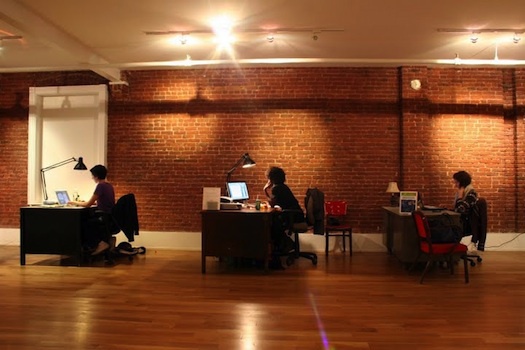
Many coworking spaces are housed in meticulously designed lofts. Photo from Green Spaces, NYC.
The shift from an ownership economy to an economy of sharing has been one of the most important movements of the past few years – a concept most eloquently captured in Rachel Botsman's notion of collaborative consumption. From car- and bike-sharing to bookcycling reading clubs, the decentralization of resources is enabling us to have more by owning less — because, as Kevin Kelly puts it, "access trumps possession." So far, however, the majority of this resource-sharing has been experienced on the individual level: though enabled by a community of car-sharers, your ride in a ZipCar is no different and no less solitary than a ride in any other car. But an emerging groundswell is bridging shared resources and shared experience by taking collaborative consumption to a promising new frontier: The workplace.
A rapidly proliferating number of coworking spaces worldwide is attracting creative entrepreneurs and freelancers across the entire spectrum of vocations, from startup founders to professional proofreaders. Designers, developers, writers, photographers, lawyers, hackers and other independent doers are coming together in shared spaces that offer all of the practical benefits of a traditional office and none of its cubicle-clinging, 9-to-5-abiding confines. Far from the merely utilitarian consideration of lower costs — everything from rent to printing to coffee is cheaper when it's shared — these hubs offer a unique environment for what I like to call "creative restlessness": that distinct itch to contribute to the world typical of those who have chosen to make a living from their life's calling.
In New York City alone, dozens such coworking spaces exist. New Work City in Little Italy, a self-enforcing community open to all, aims to make it easier for like-minded independent workers to live happier, more productive lives. The Makery in Williamsburg brings together writers, early-stage startups and other freelancers. Green Spaces, with locations in both New York and Colorado, offers a coworking space for sustainability-oriented small business and also serves as a green business incubator. In Good Company is a community for women entrepreneurs co-founded by Artists & Fleas founder Amy Abrams. New York Nightowls is a late-night coworking club for bloggers, meeting between 10 p.m. and 4 a.m.
Coworking spaces fused with incubators are even popping up under the wings of existing funds. Betaworks, whose claims to fame include the popular URL shortener bit.ly and leading Twitter desktop client TweetDeck, serves as a coworking space for tech entrepreneurs. Dogpatch Labs, a self-described "frat house for geeks" with locations in Cambridge, New York and San Francisco, offers desk space, bandwidth, coffee and lunch to aspiring entrepreneurs and connects them with one another as well as potential investors in a spirit of "open-source entrepreneurship."
I've recently had the pleasure and privilege of joining studiomates — a stunning all-white loft in DUMBO with a magnificent view of the East River and Lower East Side. Studiomates is the brainchild of design tastemaker Tina Roth Eisenberg, better-known as Swiss Miss, who operates it in tandem with socially responsible design outfit Workshop. Tina articulates the unique energy and draw of coworking:
I started studiomates out of the belief that surrounding yourself with smart, entrepreneurial spirited people is the key to a successful and happy small business career. The studio has given birth to many fantastic new business ideas. Given the doer nature of our studiomates, many of the ideas were launched: Several websites, iPhone apps and a conference came out of our inspiring environment. The studio is my happy place.Mine, too.
Besides the clear allure of beautiful lofts with meticulously designed interiors, none of which individual freelancers would be able to afford on their own, many coworking hubs offer a range of experiential perks. In Good Company hosts various events that supply members with everything from search engine optimization strategies to health and wellness tips. Green Spaces offers free coffee and tea, a full range of sustainable options like recycling, composting and eco-printing, and even interns for project work. At studiomates, we regularly invite interesting people – from successful creative entrepreneurs to prominent designers – for an informal lunch and chat. And New Work City recently launched NWCU — a community-powered educational program featuring a curated menu of classes, hackathons, meetups and other events by NWC members.
Not sure how to find one? Coworking, a free iPhone app, locates coworking hubs around the world. WorkSnug takes it one step further, using augmented reality to geolocate a coworking space in your immediate surroundings, alongside reviews of each space's offerings. The comprehensive Coworking Wiki crowdsources coworking hub locations globally and organizes them in a directory. LooseCubes offers an ambitious visual directory of 475 hubs in 170 cities across the U.S., complete with pricing and amenities details for each. Says founder Campbell McKellar:
I started LooseCubes because I realized that working in an inspiring environment with interesting people makes me happier and more productive. And I knew I wasn’t alone. Coworking is about more than access to a desk — it leads to serendipitous conversations, new partnerships, and lasting connections. Magic happens when you work around great people.With more than 150,000 creative professionals registered with Freelancers Union in the U.S. alone, a number no doubt representing only a small fraction of these sole creative warriors stateside and worldwide, today's coworking landscape is only the tip of a staggering iceberg. The movement mixes collaborative consumption and collaborative creation in a bouquet of benefits over the age-old centralized workspace model — offering a more creative and flexible environment than the traditional office, relieving the financial burdens of running your own private studio, and providing the creative and intellectual simulation that working from home doesn't.
And, perhaps most important, how many people get to call their office their happy place?


Comments [10]
01.24.11
02:03
01.24.11
05:06
01.24.11
08:01
It's a new thing to have easy access to all the skills needed to build anything :).
Would love to continue this conversation with anyone interested; I'm affiliated with the Baltimore Beehive (beehivebaltimore.org), and Cahoots (Cahoots.co).
01.24.11
08:09
01.25.11
04:03
01.25.11
01:37
01.26.11
02:23
kind regards
Carlos
01.26.11
09:28
01.26.11
02:58
Adelaide
02.03.11
03:04